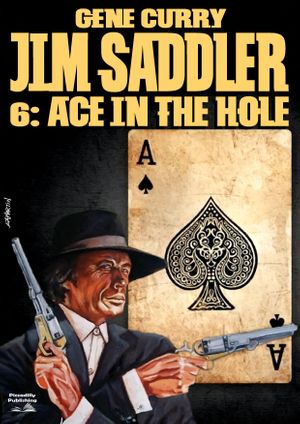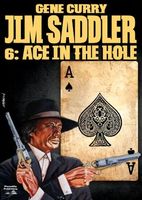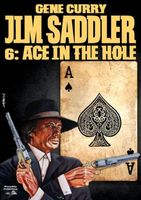- Welcome to FictionDB, Guest
- | My Account
- | Help

Ace in the Hole — Gene Curry

-
Published:
Apr-2018 -
Formats:
Print / eBook -
Series:
-
Main Genre:
Historical -
Time Period:
19th Century American West -
Pages:
181 -
Rating:
-
Purchase:
-
Share:
Jim Saddler was down to his last buck in a cathouse in Jackson Hole when the infamous Butch Cassidy and his boys stormed in. The outlaw, looking for a reliable gun, pressed Saddler into joining up.
Saddler was in no position to refuse -- especially when Cassidy took him along to the gang's impregnable Hole-in-the-Wall hideout. Once there, Saddler found the good side of an awkward situation: the presence of more than a few unattached women eager for attention.
But things got too hot too fast. When he wasn't robbing trains, Saddler had to service his share of outlaw women, including Cassidy's girl, the beautiful Etta Place. Then there was ‘Mad Dog' Harry Tracy, who forced a showdown with Butch for control of the gang -- with Saddler and his women caught right in the line of fire!
Peter J. McCurtin was born in Ireland on 15 October 1929, and immigrated to America when he was in his early twenties. By the early 1960s, he was co-owner of a bookstore in Ogunquit, Maine, and often spent his summers there.
McCurtin's first book, Mafioso (1970) was nominated for the prestigious Mystery Writers of America Edgar Award, and filmed in 1973 as The Boss, with Henry Silva. More books in the same vein quickly followed, including Cosa Nostra (1971), Omerta (1972), The Syndicate (1972) and Escape From Devil's Island (1972). 1970 also saw the publication of his first “Carmody” western, Hangtown.
McCurtin's view of the frontier is harsh and unforgiving, a place where a man with any sense looks to his own safety, and to hell with everyone else. His westerns are fast, violent and chauvinistic, but the violence and sex are seldom overtly explicit.
McCurtin's editor at Leisure Books remembers that he was “a terrific, fluent, natural writer of action, and a solid researcher for his westerns and mysteries. Leisure did not, in my time (1979-1981), let anyone else write under Peter's name, but Peter wrote under other names in addition to his own byline. He was a real workhorse with, unfortunately, an alcohol problem (like so many), and without question the very best writer that Leisure was publishing at the time. Perhaps he could have been better and more prolific under better circumstances.” For a while, McCurtin himself also worked as an editor at Leisure Books.
An acquaintance adds: “When he wrote most of his books, he lived in a studio in Murray Hill, on 39th Street, only a few blocks from the New York offices of Tower Books, which at the time were located at 2 Park Avenue. His building was called the Tuscany Towers back then. It's now a W Hotel. He had a Murphy bed, a kitchenette, and a desk with manual typewriter. There was no phone except for the payphone in the building basement. He liked eating at Automats, he went to the movies several times a week and spent a lot of time reading.”
Peter McCurtin died in New York on 27 January 1997. His westerns in particular are distinguished by unusual plots with neatly resolved conclusions, well-drawn secondary characters, regular bursts of action and tight, smooth writing. if you haven't already checked him out, you have quite a treat in store.
Saddler was in no position to refuse -- especially when Cassidy took him along to the gang's impregnable Hole-in-the-Wall hideout. Once there, Saddler found the good side of an awkward situation: the presence of more than a few unattached women eager for attention.
But things got too hot too fast. When he wasn't robbing trains, Saddler had to service his share of outlaw women, including Cassidy's girl, the beautiful Etta Place. Then there was ‘Mad Dog' Harry Tracy, who forced a showdown with Butch for control of the gang -- with Saddler and his women caught right in the line of fire!
Peter J. McCurtin was born in Ireland on 15 October 1929, and immigrated to America when he was in his early twenties. By the early 1960s, he was co-owner of a bookstore in Ogunquit, Maine, and often spent his summers there.
McCurtin's first book, Mafioso (1970) was nominated for the prestigious Mystery Writers of America Edgar Award, and filmed in 1973 as The Boss, with Henry Silva. More books in the same vein quickly followed, including Cosa Nostra (1971), Omerta (1972), The Syndicate (1972) and Escape From Devil's Island (1972). 1970 also saw the publication of his first “Carmody” western, Hangtown.
McCurtin's view of the frontier is harsh and unforgiving, a place where a man with any sense looks to his own safety, and to hell with everyone else. His westerns are fast, violent and chauvinistic, but the violence and sex are seldom overtly explicit.
McCurtin's editor at Leisure Books remembers that he was “a terrific, fluent, natural writer of action, and a solid researcher for his westerns and mysteries. Leisure did not, in my time (1979-1981), let anyone else write under Peter's name, but Peter wrote under other names in addition to his own byline. He was a real workhorse with, unfortunately, an alcohol problem (like so many), and without question the very best writer that Leisure was publishing at the time. Perhaps he could have been better and more prolific under better circumstances.” For a while, McCurtin himself also worked as an editor at Leisure Books.
An acquaintance adds: “When he wrote most of his books, he lived in a studio in Murray Hill, on 39th Street, only a few blocks from the New York offices of Tower Books, which at the time were located at 2 Park Avenue. His building was called the Tuscany Towers back then. It's now a W Hotel. He had a Murphy bed, a kitchenette, and a desk with manual typewriter. There was no phone except for the payphone in the building basement. He liked eating at Automats, he went to the movies several times a week and spent a lot of time reading.”
Peter McCurtin died in New York on 27 January 1997. His westerns in particular are distinguished by unusual plots with neatly resolved conclusions, well-drawn secondary characters, regular bursts of action and tight, smooth writing. if you haven't already checked him out, you have quite a treat in store.
Genres
Sub-Genres
Click on any of the links above to see more books like this one.


